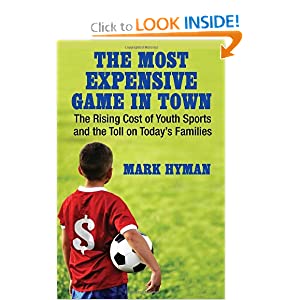
The highlight of my short lived sports career happened in 8th grade when my town recreational soccer team did the impossible and won the championships. We weren’t supposed to win, we were not favored; however, with great coaching and amazing teamwork we pulled off the upset. While winning the big game was memorable, the part I will always cherish were the practices and games that lead up to that moment. I just enjoyed playing and being with my teammates.
Growing up it didn’t matter if the game was part of an organized league or just a thrown together scrimmage, I just wanted to play. When I look at youth sports today I wonder, “Do kids feel the same way as I did?”
As a youth minister I love watching my teens play for their school or town teams; however, it’s also created a tension in my life. As each year passes by it seems like the schedules get more dense and the travel gets farther. As a result practices, games and tournaments conflict with church. I’m finding more and more teens being forced to choose between ministry and sport. Why is that?
In his book THE MOSE EXPENSIVE GAME IN TOWN: The rising cost of youth sports and the toll on today’s families author Mark Hyman reveals the ever increasing popularity of youth sports in this country. The times of sandlot baseball games and backyard football challenges are slowly disappearing as more leagues, and tournaments enter into the scene. The reason this is a must read is because it addresses topics and issues that parents, and youth workers need to face, such as:
- FINANCES: The cost is going up, especially when it comes to travel teams for youth sports. What this book will do is challenge parents to start counting the receipts and answer the question, “Am I spending too much?” Basically, they need to know if the investment is worth it.
- BOUNDARIES: Tournaments are gaining popularity; therefore, teams are hoping on buses and planes to participate. This means less family time at home and more on the road. Not that travel is bad; however, how much of a toll does riding in a car and sleeping in a hotel take on a family’s dynamics.
- FALSE PROMISES: Even corporations are getting in on the game, telling teens if you drink this or eat that you can be like your favorite sports star. From equipment to accessories families are being pressured to invest in whatever it takes for them to reach the next level in sports. With only a limited amount of openings at the highest level, the question becomes, “Am I buying the hype?”
- IDOLATRY: Youth sports are great for the teens when it comes to socialization, exercise and team building skills. As parents we enjoy seeing our children succeed; however, is it because it brings them joy or gives you value? When the sport becomes more important than your relationships with others, especially God it becomes an idol. Families should engage in recreational activities because of how it helps you grow and not only what it does for you.
While this book addresses many of the negative issues arising in youth sports it does end on a very positive note. In the last chapter author Mark Hyman talks about the opportunities sports can provide for an individual. On top of opening doors it can teach valuable lessons in team work, facing adversity and leaning in during high pressure moments.
As youth workers we need to make sure that the families we serve are aware of these issues. Again, athletics are important for this next generation. You and I need to make sure that when decisions are made, that it is with God in mind.
How do you perceive youth sports? What type of impact does it have on your ministry?